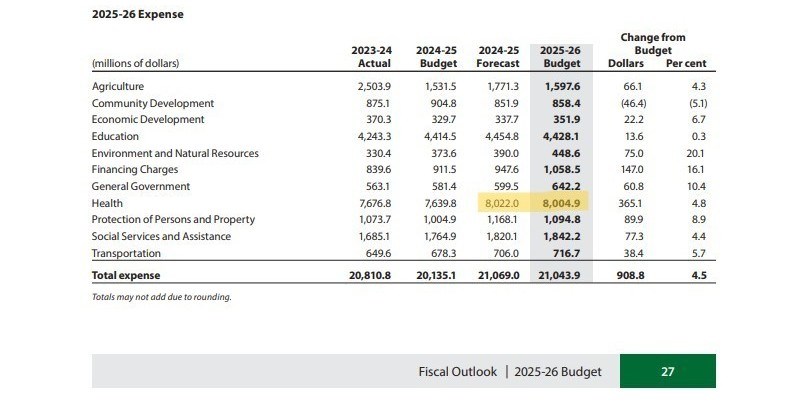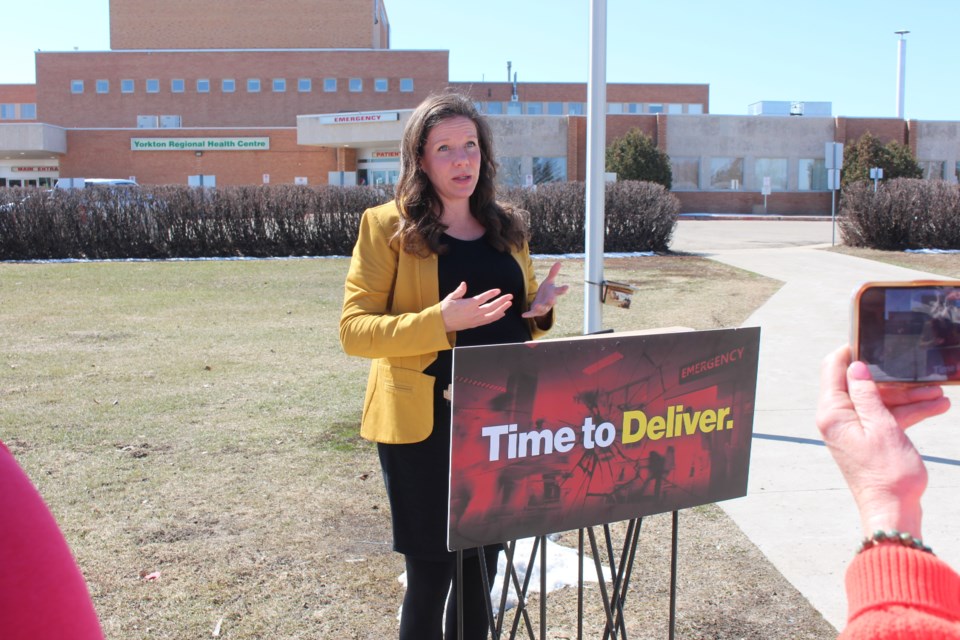YORKTON – Saskatchewan NDP Shadow Minister for Rural and Remote Health Meara Conway is sounding the alarm on what she calls a worsening healthcare crisis in rural Saskatchewan.
Citing significant service disruptions and chronic staffing shortages, Conway says that it has left many communities struggling to access essential care.
Conway, a mother of two who is expecting her third child, said her personal experience as a parent reinforces the urgent need for reliable healthcare access, particularly in rural areas.
"Like any parent, I understand the importance of having reliable access to good quality health care where and when you need it," said Conway in a scrum with reporters outside the Yorkton Regional Health Centre, adding, "nowhere is that more under threat right now than in rural Saskatchewan."
Last week, the Saskatchewan NDP launched its "Time to Deliver" healthcare tour to highlight the widespread closures and service disruptions affecting healthcare delivery across the province.
"We are in a healthcare crisis," said Conway, "people are being forced to travel further and to wait longer."
According to Conway, Freedom of information (FOI) data obtained by the NDP reveals that, between August 2019 and May 2024, rural Saskatchewan experienced more than 500 days of disruption to obstetric services and over 4,000 days of disruption to emergency acute care services.
Yorkton, a central healthcare hub for many surrounding communities, saw a total of 72 days of service disruption during this period.
"Yorkton-specific data that was revealed as part of the FOI request showed that Yorkton experienced—during that time frame—a total of 72 days of disruption and a total of 12 disruptions of different lengths," Conway said.
According to the FOI data, Yorkton Regional Health Centre has three listed obstetrical outages totaling seven days during that period. During that same period, YRHC saw 72 days of disruptions, which included 12 total disruptions, but there is not a lot of detail about what made up those disruptions, they are simply referred to as “medical services“or “other“ disruptions.
Conway noted that challenges remain in obtaining detailed information about healthcare interruptions, making it difficult to fully understand the impact of the disruptions.
"One of the issues we've had with digging into the issues in Yorkton is that the FOI data we've received is not specific," said Conway, "it just says that these disruptions were due to medical services. We don't get any more information or detail other than that, and that makes it kind of an outlier."
Conway pointed to staffing shortages and emergency room closures in communities surrounding Yorkton—such as Kamsack, Preeceville and Canora—as contributing factors in the strain on local healthcare services.
"We have spoken to many frontline healthcare providers—nurses, healthcare workers, physicians—about many of the challenges that they're facing," said Conway, adding, "it's due to a lack of nurses. It's due to the fact that a lot of the surrounding communities that are feeders for Yorkton—Kamsack, Preeceville, Canora—these are all communities that have recently lost overnight emergency services."
"Three or four communities are often feeding into Yorkton," said Conway.
"I understand that overnight we have one emergency room doctor working in Yorkton, serving all of these communities," said Conway, adding, "when we see those closures to surrounding rural smaller communities that just puts pressure on an already overburdened situation here in Yorkton," said Conway, "we're the birthplace of medicare. We think people deserve better than closures, chaos and chronic short staffing."
"Reliable access to quality healthcare is absolutely essential to a bright future in any community, but particularly in rural communities. When we see that healthcare slip, that's when it's really hard to keep those communities intact and strong and vibrant," said Conway.
The "Time to Deliver" tour has engaged with communities across the province, including Shellbrook, North Battleford, Prince Albert, Moose Jaw, Melville, and Qu’Appelle.
"We're really visiting as many communities as possible," said Conway, adding, "the themes are similar. The challenges in every community are a bit unique, but these are broader themes. We see accelerating disruptions and closures. People are very concerned, and of course, that's impacting frontline communities, patients, and families that need healthcare."
Conway expressed concern over gaps in publicly available healthcare disruption data, noting that the Saskatchewan Health Authority has changed its approach to reporting service interruptions.
"What we understand is that the issues are persisting. In many communities they're only getting worse," said Conway, noting Kamsack, Canora and Preeceville service closures "were supposed to be temporary but they're still ongoing—the daytime ER hours."
"We have seen SHA change their practices around what they post. They used to post more disruptions, now it has to be longer than seven days before they post it," said Conway.
"Often people will just show up to an emergency and they'll have a notice on the door. There's no reason to do that except to just sort of shield the government from criticism and protect their reputation," said Conway.
"If my power goes off, I can go to Twitter and get an update from SaskPower, but you can't tell me when my ER is closed? It's dangerous," added Conway.
She also warned that ongoing budget cuts would further strain rural healthcare systems.
"One of the things we're really concerned about is this budget cuts healthcare by $17 million," said Conway, "they're denying this, but if you look at what they actually spent last year on healthcare and what they're budgeting to spend this year, it's a reduction of $17 million at a time when we can't afford to cut healthcare."

Conway criticized the provincial government’s reliance on travel nurses to fill gaps in staffing, arguing that the approach is costly and undermines permanent healthcare workers.
"What they are relying more and more on is travel nurses—very expensive. Often travel nurses don't have the experience that they need. It contributes to lower morale for the nurses that are here because if you look at what these travel nurses are being paid, they're often not able to do as much and they're paid much more," said Conway.
"It's really hard on the frontline nurses that are permanently in communities. We've seen a lot of retirements. A lot of people just burning out," added Conway.
Conway also raised concerns about the government's response to long-standing calls for a nursing task force.
"We need to be doing better in terms of engaging frontline healthcare workers and listening to them. They actually have a lot of ideas and solutions. We just haven't seen a government that is showing much humility," said Conway, adding, "if anything I think a lot of frontline healthcare workers feel disrespected."
Conway criticized the government’s handling of the healthcare system, suggesting that the ongoing deterioration could pave the way for privatization.
"We have accused them of that in the past," said Conway, adding, "it's something out of a conservative playbook; you undermine the public service and say 'oh, it's not working,' and by then, no one wants to defend the system that's broken, so you introduce private options. We've wondered about that ourselves."
"The biggest thing to me is the Sask Party has a lot of support in rural communities but it just really seems like they're being taken for granted, and healthcare is the biggest indicator of that."
Conway emphasized the importance of maintaining a strong public healthcare system, particularly for rural Saskatchewan.
"The reason that public medicare was introduced, and the communities that need it the most, were rural communities because it's not necessarily going to be profitable to provide healthcare in these smaller, more spaced-out communities," said Conway, "I think it's really important to keep it strong and vibrant because they have a bigger stake in the model and that's of course why the model was brought in to begin with."




